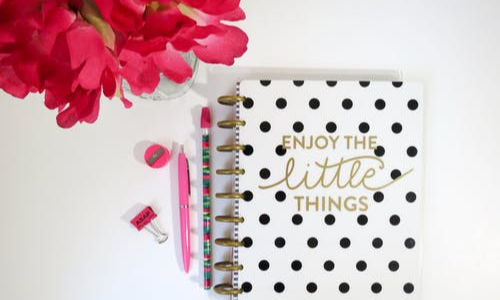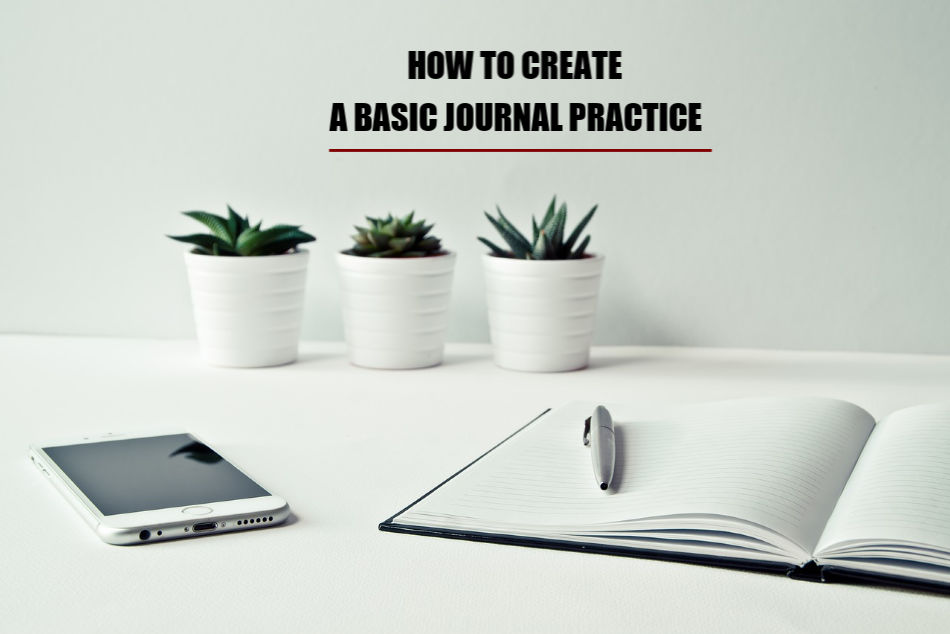When you think about creating a basic journal practice does it make you feel excited or overwhelmed? No need to, just think of the payback it gives-self improvement.
If you feel a little overwhelmed getting started, journaling isn’t something you need to think long and hard about.
Here’s why, if you aren’t really sure how to add it to your life, it might be that you are overthinking it.
What is a Journal?

A journal is a detailed description of your introspections, reflections or self-analysis which is geared towards helping you with self improvement.
Its many uses range from analyzing your feelings, reflecting on your goals, examining your dreams, gaining insights, or adding details to the ideas you have. The list is endless.
It often has an open or blank format in order to accommodate the considerable amount of writing that comes with it.
How do you start writing a journal

There is nothing mind-boggling in starting to write a journal. The fact of the matter is journaling is nothing more than putting your thoughts or ideas onto paper.
Don’t be intimidated, you don’t need anything special or fancy to start a journal. It doesn’t matter whether it’s a regular journal, a notebook, a binder. Even if you choose to use your computer, it’s perfectly fine.
Start with today and write about your day today. That’s the easiest thing to do. Simply grab your pen and get started.
Did anything of significance happened today? How did you feel about it? Is there anything you would change? What would you do the same?
There are no hard or fast rules. But, chances are, you might prefer a journal format if you’re looking to implement your goals, gain self-growth or discover something about yourself.
There are also tons of journal layout. Determining your purpose for writing is the basis for deciding which format to use and is most effective for you if you prefer to go that route.
Just be mindful as you move forward in your journaling practice, that as with any new habit, it will take a little time to find and develop a routine that works for you.
To help you start finding motivation, here are some tips for creating a basic journaling practice.
Know Why You Are Journaling

Before you you do anything else it’s important that you pay attention to your why.
you need to know WHY you are doing it. If you don’t figure out your own reasons, it will be very hard to stay motivated.
Think about it, what are your goals for journaling? In other words, What made you want to start writing in a journal?
Are you trying to express more gratitude? Or do you just want a secured space to vent? Was it a recommendation to help relieve stress?
All of this matters because it helps you understand the importance of this as a daily practice, as well as helping to keep you motivated.
Here’s the thing, you don’t need to start being worried about style and substance right now, just start simple.
Work on making it a daily habit. Don’t make it hard – just get going.
It really doesn’t matter when you choose to do it, the important thing is that you write every single day.
Consider a Morning or Nighttime Routine

For a journaling practice, you want to create a routine. When you do that, it will naturally turn into a habit and naturally becomes a part of you.
Don’t drag your feet when it comes to writing in your journal. Start by figuring out if you prefer to write in the morning and make it a part of your morning routine. This will help to set the tone for your day.
Or if at night time just before bed works best, it’s all up to you. This works especially well for gratitude journals.
In this way, you have a win-win situation. You can hit the sack thinking about all the things you are grateful for instead of things you’re worried about. But this is going to depend on your personal preference and your schedule.
Try to set it up so that it becomes a ritual and a habit. Journaling every single day is going to be more effective than just doing it when you feel like it.
I do believe you must have a little downtime throughout the day. Or, get to a point where you want something to help you relax and break away from the grid for a little bit.
Decide What You Want to Journal About

Do you have a specific purpose for your journal? Maybe you are working on the law of attraction so you are using your journal for scripting. Or you have a lot on your mind and need a place to vent and figure things out.
You really don’t need to write about the same thing every day in your journal, but this is going to help you to figure out the best journaling practice.
For instance, if your WHY is to help relieve anxiety or stress. When you include things like soothing music or essential oils to your space while you write, it really is going to boost your practice all-around.
Set Up Your Journaling Area

It does help a lot if you have a designated area for journaling. This creates ambiance and turns it into something you really look forward to.
Maybe you have an office where you can set up designated space, you probably have a little desk arrangement in your bedroom, or you can even write at your dining room table-this absolutely works just fine. Don’t make this too hard. Work with what you have.
Earmark that space. Set the scene- Set it up with your journal, writing tool of choice, and a little ambiance like soothing music and candles.
While you’re at it, you may even decide to add a cup of coffee, tea or a glass of wine to the mix.
Benefits of Journaling

Journaling is all the rave these days and creeps into many conversations. People are learning the benefits of journaling, the different ways they can use them and how to create journaling habits.
While journaling might not be able to solve all your problems, it can definitely help you in a lot of ways with your issues.
There are a myriad of benefits, including:
1. Reducing stress and anxiety
If you are struggling with stress or anxiety, just writing about your feelings and what is bothering you can have a tremendous effect on your life.
It allows you to get those emotions out and really figure out what is triggering your stress or making your anxiety worse.
2. Helping to set and achieve goals
Journaling can also be used to help you figure out what your most important goals are. This can help you to focus on them, and then start working towards achieving them.
3. Finding clarity in your life
If you feel like you are going in circles or baffled about where you are or what your next steps should be; and you aren’t really sure why you feel stuck. You might need a little clarity.
This is one of the best benefits of journaling.
4. Making a big decision
Another way journaling can benefit you is by helping you to make a big decision.
Just by writing out your feelings, whether it is deciding on a new job or moving to a new home in another state can help guide you in the right direction.
5. Venting and releasing frustration
Sometimes, you just need to vent, without involving another person.
Your journal is a safe, sacred place where you can vent about anything that is currently bothering you, then move on from it.
It Should Not Replace Professional Help

Keep in mind that while journaling can be used to complement professional help, it should not replace it.
No, it is not going to solve all the problems in your life. But even therapists often recommend writing in a journal in addition to seeing them on a regular basis can help with your issues.
It’s often used in addition to medical and mental help treatments. You can use your journal to write down how you feel when you’re anxious or your depression starts getting worse. On top of that, you can also use it to make note of triggers of your gut issues.
It is still very important to seek professional help when you are dealing with something involving your health, whether physical or mental.
How Journaling Can Help Your Relationships

Aside from the more common benefits of journaling, like helping you to achieve your goals, figure out your feelings and emotions or just to vent , journaling can also help with your personal relationships and friendships.
Relationship With Yourself

One of the most important relationships you can have is the one you have with yourself.
Journaling is by far one of the best things you can do to heal the relationship you have with yourself.
For starters, it is going to help you think more positively, especially if you are trying to gain insight into why you talk negatively to yourself.
When you understand your own strengths, your weaknesses and what makes you tick, are all a result of having a good relationship with your body and your mind.
The more you can love, accept and appreciate yourself- flaws and all, the more you will be able to love and appreciate the other people in your life.
For this reason, it is essential that you are open and honest in your journal. This is a place where you can really put everything on the table and say what you are thinking and feeling. Nobody ever has to read it but you.
Other Relationships

If you are having a hard time in your personal relationship, or you just need to find some clarification, journaling can be very useful.
Start by just writing who you are having issues with and what is causing you the most misery, worry or pain.
Maybe there are lots of disagreements with this person and you don’t feel like they are meeting you halfway. Or, the two of you keep butting heads about a particular issue.
On the flip side, you might feel like you aren’t sure this is the right person for you and are trying to figure things out.
Whichever way the ball bounces, journaling can help you straighten out your thoughts and find more clarity. You just need to be honest with how you feel.
There are two sides to every story, but yours is the only one you have to be concerned about when you are writing in your journal. Even if you think it is self-centered or that part of it might be your fault.
Friendships

It can also be helpful in platonic relationships, including your friendships or relationships with family.
Similarly, writing about your friendships or family members in your life, both with things you appreciate and love about them, and some issues you might be having with them.
This can be really therapeutic and actually sometimes make those bonds stronger.
Finally, The main reason for keeping a journal is that it will help you deal with the things that happen to you as well as the things that have not happened to you.
Writing it down helps you remember what you did right as well as areas you need to make changes.
It also helps you improve your decision-making capacity. The main thing is just to get started journaling in any way that works for you.
Here’s a youtube video by Overall Adventures that will demonstrate that it is not difficult at all to start a journal practice.
Have you created a journal practice? How has it helped you?























